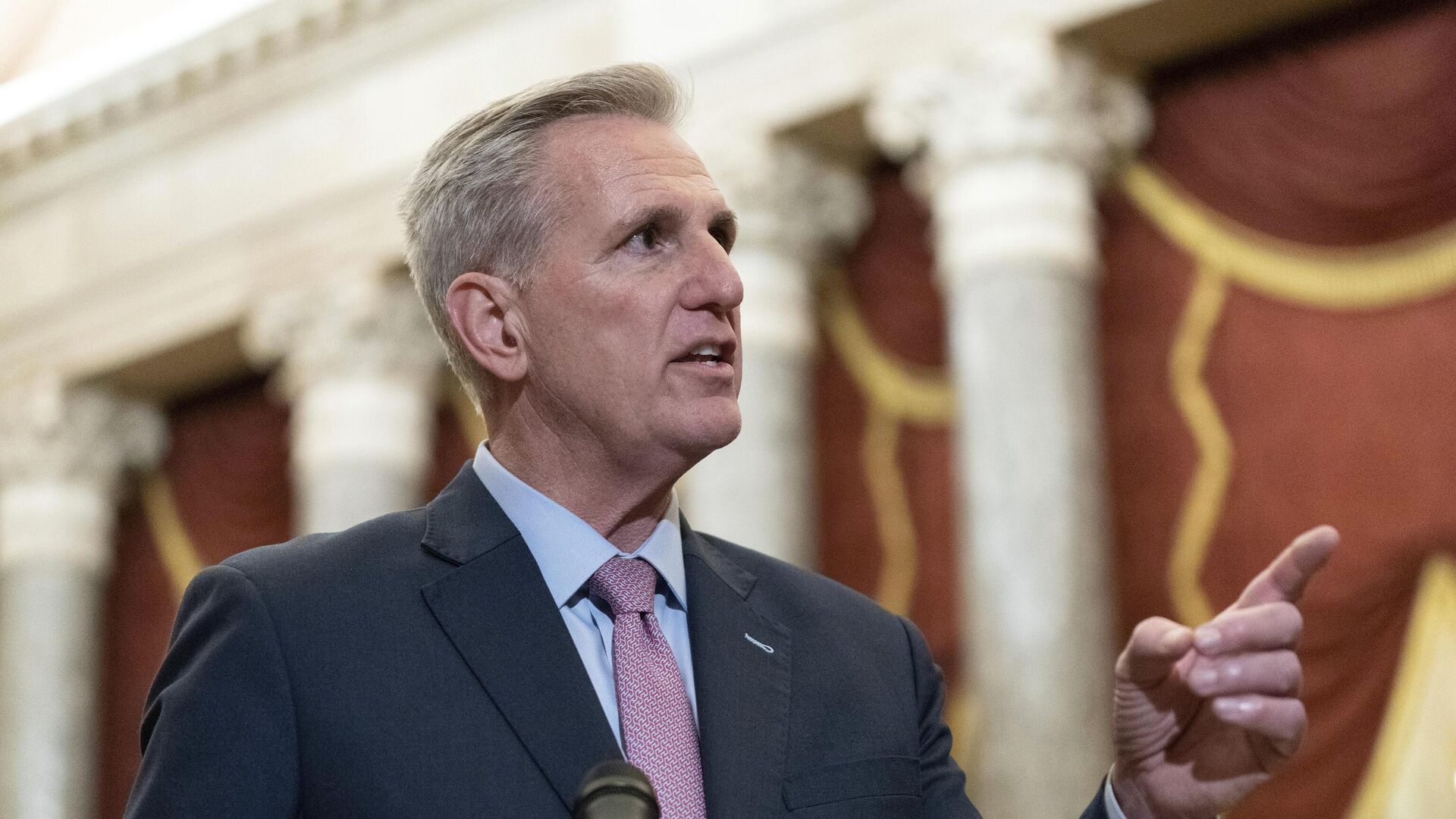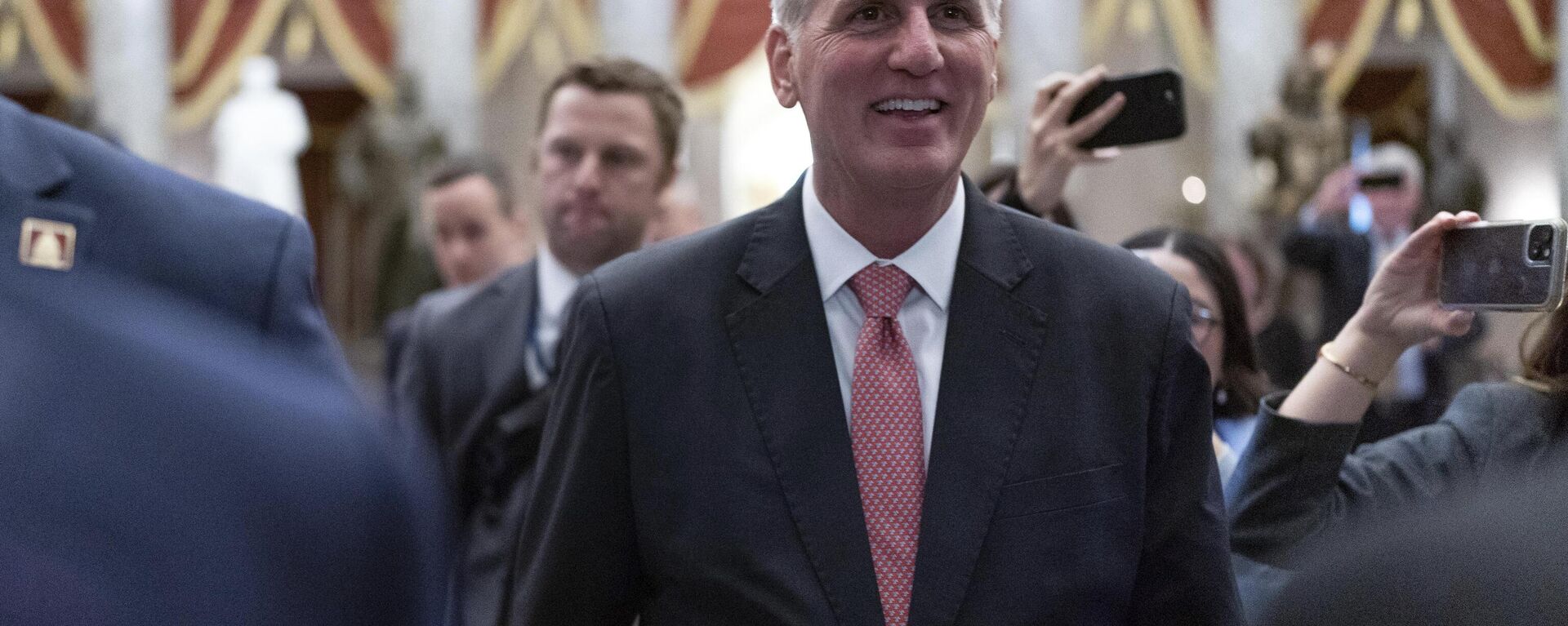https://sputnikglobe.com/20230427/us-closer-than-ever-to-debt-debt-ceiling-crisis-thanks-to-partisan-infighting-1109893352.html
US Closer Than Ever to Debt Ceiling Crisis Thanks to Partisan Infighting
US Closer Than Ever to Debt Ceiling Crisis Thanks to Partisan Infighting
Sputnik International
Republicans and Democrats are once again trying to score political points against each other in the perennial fight over the federal budget. David Tawil warned that this time it could really go over the cliff edge.
2023-04-27T19:03+0000
2023-04-27T19:03+0000
2023-04-27T19:21+0000
kevin mccarthy
us
us congress
americas
debt ceiling
default
'default scare"
us treasury
us treasury department
government spending
https://cdn1.img.sputnikglobe.com/img/07e7/01/07/1106102072_0:0:3073:1728_1920x0_80_0_0_b3107a6441b404dd2417ecdfa3625f4d.jpg
The US is at more risk than ever of having to shut down government spending as politicians battle over how high to set the federal borrowing limit.House Speaker Kevin McCarthy (R-CA) has introduced a congressional bill allowing President Joe Biden's administration to raise its debt ceiling to an eye-watering $1.5 trillion, but only in return for cuts to its federal spending programmes. Investment fund manager David Tawil warned Sputnik that "we're in big trouble here" if Congress does not vote to raise the debt cap.But that would suit the US Federal Reserve, whose priority is to cut inflation and will be hoping the freeze in government funding dampens consumer spending. While McCarthy's bill passed a vote of the lower House of Representatives on Wednesday, it may still face stiff enough resistance in the Democrat-controlled Senate to fall.The investment fund manager said that, going by the experience of previous years, the two warring parties may eventually "get to a deal." But "this time is slightly different in the fact that there are attachments that are being made," Tawil said. "Plus, there also is a fair amount of disagreement in each party, by the way, in terms of how much wheeling and dealing should be done."In previous government funding battles, Democrats have come out ahead in the public opinion stakes — but this time could be different.For more soundbites from David Tawil on the debt ceiling battle, go to our Telegram channel.If you enjoyed this article, check out our Sputnik Radio show The Final Countdown.
https://sputnikglobe.com/20230426/us-house-clears-gop-debt-ceiling-bill-in-first-win-for-mccarthy-after-tense-negotiations-1109864935.html
americas
Sputnik International
feedback@sputniknews.com
+74956456601
MIA „Rossiya Segodnya“
2023
James Tweedie
https://cdn1.img.sputnikglobe.com/img/07e4/08/1c/1080307270_0:3:397:400_100x100_80_0_0_7777393b9b18802f2e3c5eaa9cbcc612.png
James Tweedie
https://cdn1.img.sputnikglobe.com/img/07e4/08/1c/1080307270_0:3:397:400_100x100_80_0_0_7777393b9b18802f2e3c5eaa9cbcc612.png
News
en_EN
Sputnik International
feedback@sputniknews.com
+74956456601
MIA „Rossiya Segodnya“
Sputnik International
feedback@sputniknews.com
+74956456601
MIA „Rossiya Segodnya“
James Tweedie
https://cdn1.img.sputnikglobe.com/img/07e4/08/1c/1080307270_0:3:397:400_100x100_80_0_0_7777393b9b18802f2e3c5eaa9cbcc612.png
us, debt ceiling, us treasury, joe biden, us congress, government spending, kevin mccarthy, david tawil
us, debt ceiling, us treasury, joe biden, us congress, government spending, kevin mccarthy, david tawil
US Closer Than Ever to Debt Ceiling Crisis Thanks to Partisan Infighting
19:03 GMT 27.04.2023 (Updated: 19:21 GMT 27.04.2023) Republicans and Democrats are once again trying to score political points against each other in the perennial fight over the federal budget. David Tawil, co-founder of ProChain Capital, warned that this time it could really go over the cliff edge.
The US is at more risk than ever of having to shut down government spending as politicians battle over how high to set the federal borrowing limit.
House Speaker Kevin McCarthy (R-CA) has introduced a congressional bill allowing President Joe Biden's administration to raise its
debt ceiling to an eye-watering $1.5 trillion, but only in return for cuts to its federal spending programmes.
"A no-strings-attached debt limit increase will not pass," McCarthy vowed.
Investment fund manager David Tawil warned
Sputnik that "we're in big trouble here" if Congress does not vote to raise the debt cap.
"The fallout will be terrible," he said. "It'll probably only last for a little while before our politicians get their heads screwed on straight in order to go ahead and fix it. But just the triggering of it is just an awful thing, sending shockwaves throughout the country and then throughout the world for the United States."
But that would suit the US Federal Reserve, whose priority is to cut inflation and will be hoping the freeze in government funding dampens consumer spending.
"What the Fed wants is less purchasing so that inflation comes down. If people are scared and worried about recession, losing jobs, take cash, so on, you know, maybe they won't buy so much," Tawil said. "And then the Fed will be able to go ahead and begin to lighten up on its rate hikes."
While McCarthy's bill passed a vote of the lower House of Representatives on Wednesday, it may still face stiff enough resistance in the Democrat-controlled Senate to fall.
The investment fund manager said that, going by the experience of previous years, the two warring parties may eventually "get to a deal."
But "this time is slightly different in the fact that there are attachments that are being made," Tawil said. "Plus, there also is a fair amount of disagreement in each party, by the way, in terms of how much wheeling and dealing should be done."
Congress was "running out of time" and the risks of passing the deadline were greater than ever, he said, but politicians were only trying to calculate "How bad is the best the fallout going to be for me? And how easily can I go ahead and point the finger and blame it on the other guy?"
In previous government funding battles, Democrats have come out ahead in the public opinion stakes — but this time could be different.
"It frankly depends on who has the loudest megaphone and who listens to which side," Tawil said. "Maybe morally Democrats may have the higher ground here," he added, but since Biden and the Democrats are running the White House the Republicans could gain public support.
For more soundbites from David Tawil on the debt ceiling battle, go to our Telegram channel. If you enjoyed this article, check out our Sputnik Radio show The Final Countdown. 



